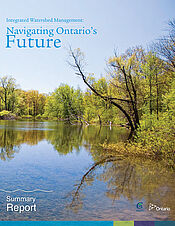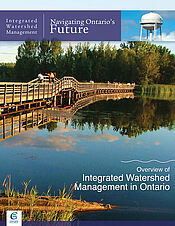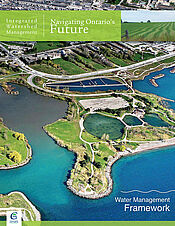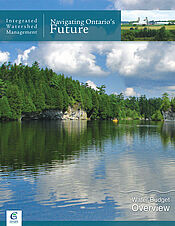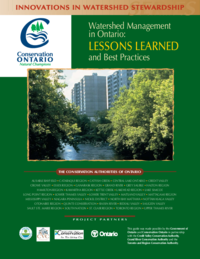Watershed Management Futures for Ontario
Conservation Ontario, in collaboration with the 36 Conservation Authorities developed a whitepaper to promote discussion between Conservation Authorities and the Province of Ontario about how we can effectively manage Ontario’s watersheds by leveraging local and provincial resources, in order to create efficiencies in Ontario’s watershed management services and programs.
Integrated Watershed Management: Navigating Ontario's Future
Ontario faces significant challenges in maintaining water quantity and quality. While grappling with multiple stressors such as climate change, intensified urbanization and growth, pollution and introduction of exotic and invasive species, watershed managers need to balance the water needs of business and citizens while at the same time guaranteeing that enough water is actually remaining on the land to meet the ecological needs of our environment.
Integrated Watershed Management (IWM) is an approach that recognizes and operates based on the interconnectedness of ecology, economy and society. In doing so, we are able to ensure that adequate supplies of good quality water are maintained for the entire population, while still preserving the hydrological, biological and chemical functions of ecosystems.
In order to improve our understanding of IWM, a shared initiative was undertaken by Conservation Ontario, Fisheries and Oceans Canada and the Ontario Ministries of Natural Resources and Forestry and Environment and Climate Change to review IWM leading to recommendations on how to update our approach to IWM in Ontario. The initiative, entitled Integrated Watershed Management: Navigating Ontario’s Future represents a series of three main reports and a summary report. Read the reports below:
Integrated Watershed Management and Climate Change
Ontario’s water resources are at particular risk from climate change. Rising temperatures and changing precipitation patterns in Ontario have already reduced river flows, warmed surface waters and dried out wetlands. These impacts will likely continue, and other threats to environmental and public health are expected to materialize, including increased flooding and diminished quantity and quality of drinking water.
Integrated Watershed Management (IWM) is a process through which decisions are made for the sustainable use, development, restoration and protection of ecosystem features, functions and linkages. IWM allows us to address multiple issues and objectives, and enables us to plan within a very complex and uncertain environment.
Lessons Learned and Best Practices in Watershed Planning
Conservation Authorities play a key role in protecting and improving water quality and quantity for Ontario. Conservation Authorities have the expertise to assist in designing and delivering effective watershed management. As well, their local networks are essential for ensuring opportunities for a variety of public, nonprofit, industry and government stakeholders to work together for the good of the local environment.
Conservation Ontario with support from the Province of Ontario created the report, Lessons Learned and Best Practices in Watershed Planning to recognize the origins of watershed management in Ontario which dates back to the 1930s. The report also highlights the watershed planning experiences of Credit Valley Conservation, Grand River Conservation Authority and the Toronto and Region Conservation Authority.
